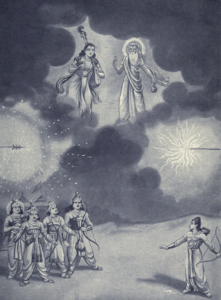The Fifteenth Day
That restful sleep didn’t last long. After less than two hours the first flashes of sunshine began to peep timidly, and then more and more decisively flooded the battlefield of Kuruksetra.
They all rose from their makeshift beds and looked around; only at that moment, looking at the plain in the light of day, the Kauravas and Pandavas shivered and realized what had happened during the night; the proportions of the slaughter that had taken place in the dim torchlight were now immense, the human and animal corpses mixed with the debris of the wagons and weapons formed dismal mountains red with blood. It was a terrifying sight. But they all stiffened their hearts and prepared for the fifteenth day of the war.
Yet those armies, so large and full of dynamism just a few days earlier, had now thinned by well over half, and the wounded soldiers with their armor shattered in several places looked like old ghosts of glory. Of course, Duryodhana, too, from his war chariot, had witnessed the incredible nighttime carnage.
“It was all your fault,” he snapped at Drona. “If you, Bhishma, Shalya and all the others had not had all this love for the Pandavas, which has always prevented you from killing them, my brothers and all these dear friends and valiant soldiers would not have died. You did not commit yourself to the maximum, otherwise we wouldn’t be here yet now. The battle would be over long ago, and with our victory.”
Drona did not reply; he looked at the Kaurava with a grimace of disgust and prepared the militias.
When they were ready, the two armies moved slowly against each other; the collision marked the beginning of hostilities.
That morning Drona set about exterminating an innumerable amount of soldiers: at that point, in order to avoid further massacres, Virata and Drupada, the father of Dhristadyumna, joined together and launched themselves against him. But little time had passed since the fighting began, when both generals of the Pandava army were shot dead.
And around the place where this tragedy had occurred a furious battle broke out. However, when Dhristadyumna saw two of his sons perish in the fire of acharya anger besides his father, beside himself with hatred, he took a vow.
“May all my virtuous acts, my austerities and my sacrifices pay me no fruit, and may I never see the heavenly planets unless I kill Drona today.”
And without waiting any longer he threw himself against him, but in the confusion caused by the numerous duels he lost sight of him and could not find him. It was Arjuna who intercepted him: at the dawn of the fifteenth day Drona aroused more fear than death itself, no one could stand in front of him for more than a few seconds.
Indra’s son stood before him and firmly gripped the famous Gandiva bow; and while he used it very skillfully with both hands, Drona invoked the supreme weapon, the brahmashtra, with the aim of destroying all his enemies in one fell swoop. A dazzling light burst from its arch and headed for Arjuna.
“Look,” said Krishna, “today the acharya is so intoxicated by his military might that he has lost the light of reason: the weapon he launched should never have been used on this planet, but only on Svarga. Hurry up Arjuna, answer with another brahmashtra, and save the whole world.”
Thus, advised by his friend, Arjuna touched water to purify his body and with rapt attention he recited the prayers thanks to which he invoked the weapon of Brahma. And a second comet of light hovered in the air and darted in the direction of the other. When those two suns met at mid-height, there was a deafening roar: the earth shook and the seas churned, and atmospheric anomalies were felt all over the world. Arjuna had managed to block the master’s weapon.
This is a section of the book “Maha-bharata, Vol. 2”.
To buy the complete book, click above
Post view 168 times




Leave a Reply